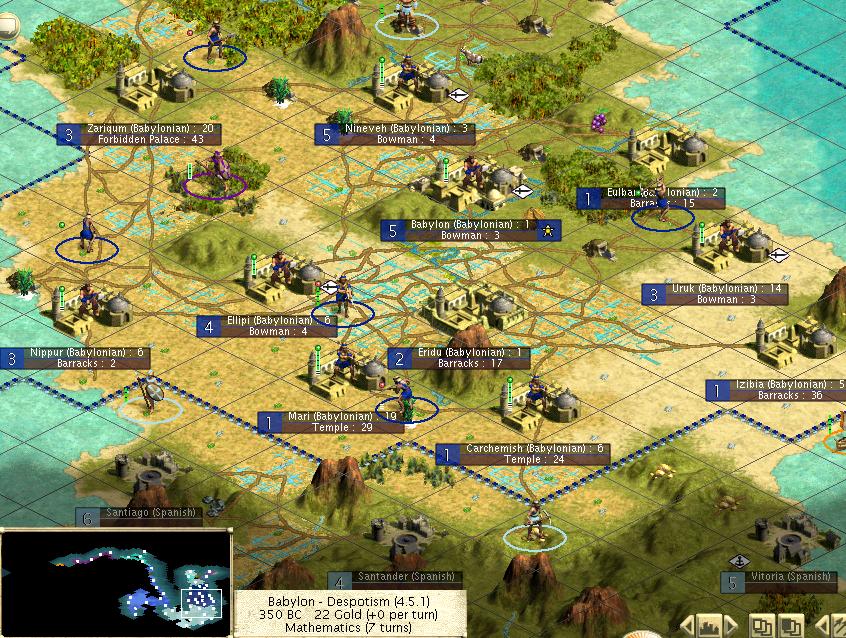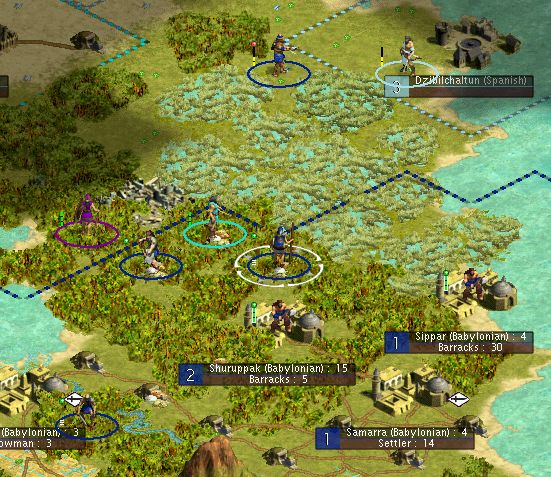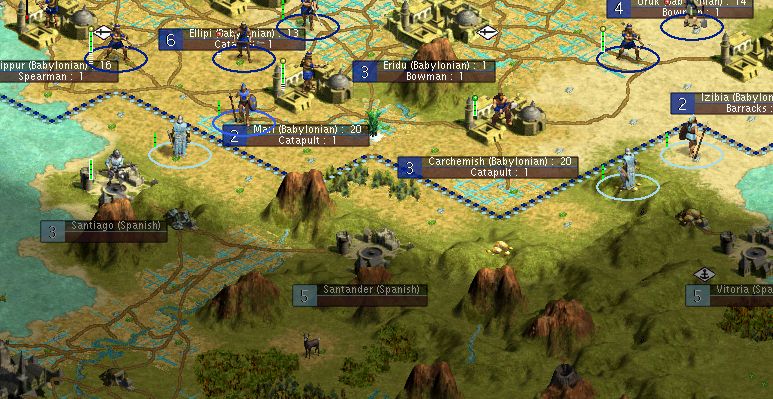http://www.civfanatics.net/uploads8/goz7_50AD.SAV
150 BC (0) - Only a couple tile swaps, for a few more commerce.
IT - Spanish drop off two regular MI right next to Nineveh. A Spanish spearman also snuck up next to Carchemish, currently undefended.
130 BC (1) - Decide to deal with the better stuff first, and select the 3/4hp Bowman outside of Asturias. The only unit inside is that same redlined archer. Unfortunately, our Bowman dies flawlessly. Luckily, no promotion, so our 2/4hp Bowman still has very good odds. But it loses too. Double check that Asturias isn't a Metropolis and that there aren't any radar towers, rivers, or hills around. Nope, just grass. So finally, I send our redlined bowman against theirs, and we manage to lose again, and I think promoted their archer. Things do improve a bit, as one of our Bowman takes out a Spanish MI, and another redlines the other MI. So our core cities are safe, barring worse luck. Move Bowman into Carchemish, so all is taken care of. Drop research to 10% and change some tax collectors to scientists, to get CoL next turn plus an extra 41g.
IT - Redlined MI dies against fortified warrior on hill, with warrior promoting. A 2/4hp MI falls to a veteran Bowman in the jungle.
110 BC (2) - CoL comes in, set to Republic, in 12 at 0gpt. The elite spearman in Santiago is now a veteran pikeman, unfortunately.
90 BC (3) - It takes three Bowmen to kill a single spearman.
IT - The archer that saved Asturias comes out, and dies to a Bowman in the jungle. Phew.
70 BC (4) - Two Bowmen die killing two spearman that were coming over the border. In a couple of turns, we might be ready to make another decent assault on Santiago. A misclick may mean we lose our curragh.
IT - Damn, we do lose the curragh.
50 BC (5) - Finally raze Asturias, but we don't have a settler in place to claim any land. The settler that I noticed in production was in a city where it wasn't growing fast enough. Oops.
30 BC (6) - Hold off for one more turn on attacking Santiago.
IT - Spanish drop off units by Nineveh.
10 BC (7) - Lose three Bowmen to units in Santiago, discovering at least four defenders. The elite spearman is still in there, and alive, in addition to two regular pikemen and a veteran. Decide to withdraw, and pillage the road between Santiago and our border.
IT - The Spanish MI and warrior die against a Bowman in Nineveh. We have gotten various demands over the past few turns, first the Americans and then Portuguese. This time, the Maya demand our last 5g, and we were researching at -1gpt. So we had to sell our barracks in Ellipi.
10 AD (8) - Kill six Spanish MI, lose one Bowman outside of Santiago. So we get a bit of good luck, as attacking vet against defending reg on flatlands is roughly 50/50.
30 AD (9) - Kill an MI, lose a Bowman. Move towards another northern Spanish city, since that is the only place we might be able to make gains.
50 AD (10) - Of our two Bowmen in the north, one is injured and one was killed on defense by an archer. In the south, I have just been killing MI as the move into range. Two cats will finish this turn, which will make our kill ratio a little better.
Future - We need to settle the north. I think that could all be ours fairly quickly and easily, except for that American settlement. In the south, we might need to do something desperate if we are really to get iron. Bowmen, even with a little catapult assistance, probably won't cut it against pikemen fortified on hills. Perhaps a well escorted settler could plop down in the middle of Spanish territory, and we'll see what happens? Not much of a plan, but I'd also rather not suicide ourselves going after this one town. Perhaps that would be the best course of action, among the few choices that we have. I would suggest buying literature as soon as we can, but we can't build up any money in our treasury as it is demanded faster than we can make it.
I left the following settler active, as the American unit moved where I intended to put the settler. We can either wait a turn or settle elsewhere. The next picture is the action in the south.








